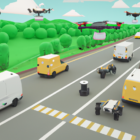In an era defined by digital transformation, Robotic Process Automation (RPA) is emerging as a game-changer for businesses across various industries. As we move through 2023, RPA is not just a trend; it is a vital technology that is enhancing efficiency, productivity, and operational agility.
What is Robotic Process Automation?
Robotic Process Automation refers to the use of software robots or bots to automate repetitive and rule-based tasks usually performed by human workers. This includes activities such as data entry, report generation, and customer service interactions. By implementing RPA, companies can achieve significant reductions in operational costs and minimize human error.
Benefits of RPA in 2023
- Increased Efficiency: RPA can operate 24/7, completing tasks at a much faster rate than human employees.
- Cost Savings: Organizations can save on labor costs and enhance resource allocation, allowing staff to focus on more critical tasks.
- Error Reduction: Automation minimizes the risk of errors that occur with manual processes, improving data quality.
- Enhanced Compliance: RPA ensures that processes adhere to compliance standards, and all actions are logged and documented.
- Scalability: Businesses can quickly scale operations up or down by deploying more bots as needed.
RPA Driving Digital Transformation
As more companies recognize the importance of workflow automation, RPA plays a critical role in driving digital transformation initiatives. It allows businesses to streamline their processes, making them more agile and responsive to market changes.
Case Studies: RPA in Action
Several industry leaders have successfully leveraged RPA to optimize operations. For example, a financial services firm implemented RPA to automate its invoice processing, resulting in a 60% reduction in processing time and a significant increase in accuracy. Similarly, a retail giant utilized RPA to enhance its order fulfillment process, improving customer satisfaction and reducing delivery times.
The Future of RPA
Looking ahead, RPA technology is expected to evolve with advancements in artificial intelligence and machine learning. This convergence will further enhance automation capabilities, enabling businesses to tackle even more complex processes.
Conclusion
In 2023, Robotic Process Automation is not just about reducing costs; it’s about transforming business operations and creating opportunities for innovation. By embracing RPA, organizations can unlock their potential and stay ahead of the competition in today’s fast-paced digital landscape.
For companies looking to enhance their operations, adopting RPA can be a strategic move towards a more efficient and productive future.




